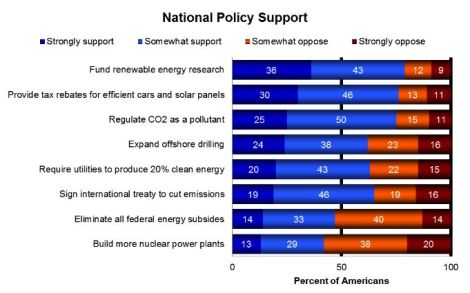
Oh, wait, not this kind of wedge?
In his much remarked-upon interview with Rolling Stone, President Obama said some (in my view fairly tepid and passive) things about climate change. What interested me more is the very first bit:
Let’s talk about the campaign. Given all we’ve heard about and learned during the GOP primaries, what’s your take on the state of the Republican Party, and what do you think they stand for?
First of all, I think it’s important to distinguish between Republican politicians and people around the country who consider themselves Republicans. I don’t think there’s been a huge change in the country. …
But what’s happened, I think, in the Republican caucus in Congress, and what clearly happened with respect to Republican candidates, was a shift to an agenda that is far out of the mainstream – and, in fact, is contrary to a lot of Republican precepts. I said recently that Ronald Reagan couldn’t get through a Republican primary today, and I genuinely think that’s true. … You’ve got a Republican Congress whose centerpiece, when it comes to economic development, is getting rid of the Environmental Protection Agency.
Doesn’t all of that kind of talk and behavior during the primaries define the party and what they stand for?
I think it’s fair to say that this has become the way that the Republican political class and activists define themselves.
Obama’s contention is that the GOP political class and activist base have worked themselves into a blind ideological fury, but most people who identify as Republican do not share their rigidity. They are more likely to lean in the direction of Independents and moderates.
If this is true, it identifies a political vulnerability. Democrats ought to be able to exploit the differences between the masses and the ideologues, to set them at odds with one another.
I’m not sure how many genuine “wedge issues” there are, actually, but one that shows up in the polls over and over again is clean energy. As I wrote back in January, clean energy is a wedge issue that favors Democrats.
The latest evidence comes from a new Yale-George Mason poll [PDF]. Here’s how it’s summarized:
Overall, majorities of Americans say that global warming and clean energy should be among the nation’s priorities, want more action by elected officials, corporations and citizens themselves, and support a variety of climate change and energy policies, including holding fossil fuel companies responsible for all the “hidden costs” of their products. A majority also say they would be more likely to vote for a candidate who supports a “revenue neutral” tax shift from income taxes to fossil fuels, and that global warming will be one of the issues that determines their vote for President this fall.
The “revenue-neutral” schtick bothers me, but that’s a subject for a different post. Here’s how policy support breaks down:
Note how much support these policies get from Republicans, even after years of anti-green agitprop from the party leadership:
- 52 percent of Republicans think global warming
should be a priority for the president and Congress. - 84 percent of Republicans think clean
energy should be a priority. - 70 percent of Republicans think that overall, protecting the environment either improves economic growth and provides new jobs, or has no effect on economic growth or jobs.
- 63 percent of Republicans support providing tax rebates for people who purchase more fuel-efficient vehicles or
solar panels. - 67 percent of Republicans support regulating carbon dioxide as a pollutant. (!)
- 51 percent of Republicans would be more likely to vote for a candidate who supported a revenue-neutral tax shift; just 25 percent would be less likely.
A new survey from the Civil Society Institute finds similar bipartisanship on these issues.
So, insofar as Dems can push the issue into the political spotlight, and frame the debate in the terms above, they have a chance to split Independents and moderate Republican voters off from the hyper-ideological GOP leadership.
It’s easier said than done, of course. For one thing, a great many fossil-fueled Democrats (“centrists,” we’re supposed to call them) are also far to the right of the median voter on these issues. The bulk of the political establishment is. So it’s not enough that Republican voters support these things in the abstract. They will not peel off from their tribe; they need a trusted Republican leader to rally behind. Nothing will change unless people start speaking up about it from inside the tribe.
For another thing, it’s not easy to determine how political battles are framed. It’s not like a poll, where voters in a state of calm contemplation respond to messages in isolation. Messages compete in the cacophony of media. The right will be pushing its own framing — big government and overspending. As the poll results show, they’ve still got a long way to go to sour their voters on clean energy, but there is some evidence they’ve started moving substantial numbers among the base. Witness:
A large majority of Americans (79%) supports funding more research into renewable energy sources. Among registered voters, 91 percent of Democrats, 80 percent of Independents, and 74 percent of Republicans support this policy. However, perhaps due in part to news stories about Solyndra, “strong support” for more research in to renewables fell from 53 percent in the fall of 2008 to 36 percent in March 2012. Meanwhile opposition to renewable energy research more than doubled, from 8 percent in 2008 to 21 percent in 2012. [my emphasis]
I can’t prove this, but I’d bet my bottom dollar that this movement has come entirely from within the party’s ideological base. The question is, what happens now? Will the right-wing base prove to be a harbinger on this? Will they drag the rest of the party along as GOP leadership chips away with Solyndra-style messaging? Or will Dems exploit the current distance between GOP extremists and the more moderate Republican and Independent masses?
A kind of test case is playing out now around the renewal of the Production Tax Credit (PTC) for wind power, without which the U.S. industry expects to lose some 37,000 manufacturing jobs. Unlike the tax subsidies enjoyed by the oil industry, wind power’s support comes up for renewal every couple of years. This year Republican leaders are angling to block it, despite support for the PTC from the U.S. Chamber of Commerce and a broad slate of Republicans in Congress.
The Yale poll didn’t ask about wind power, but a Gallup poll last February found 83 percent support (including 75 percent Republican support) for “incentives for using solar and other alternative energy resources.”
Like I said, it’s a test case. Can Republican public opinion sway enough Republican leaders? Can public opinion serve as any kind of wedge at all? So far, the PTC has stalled. We’ll see.


